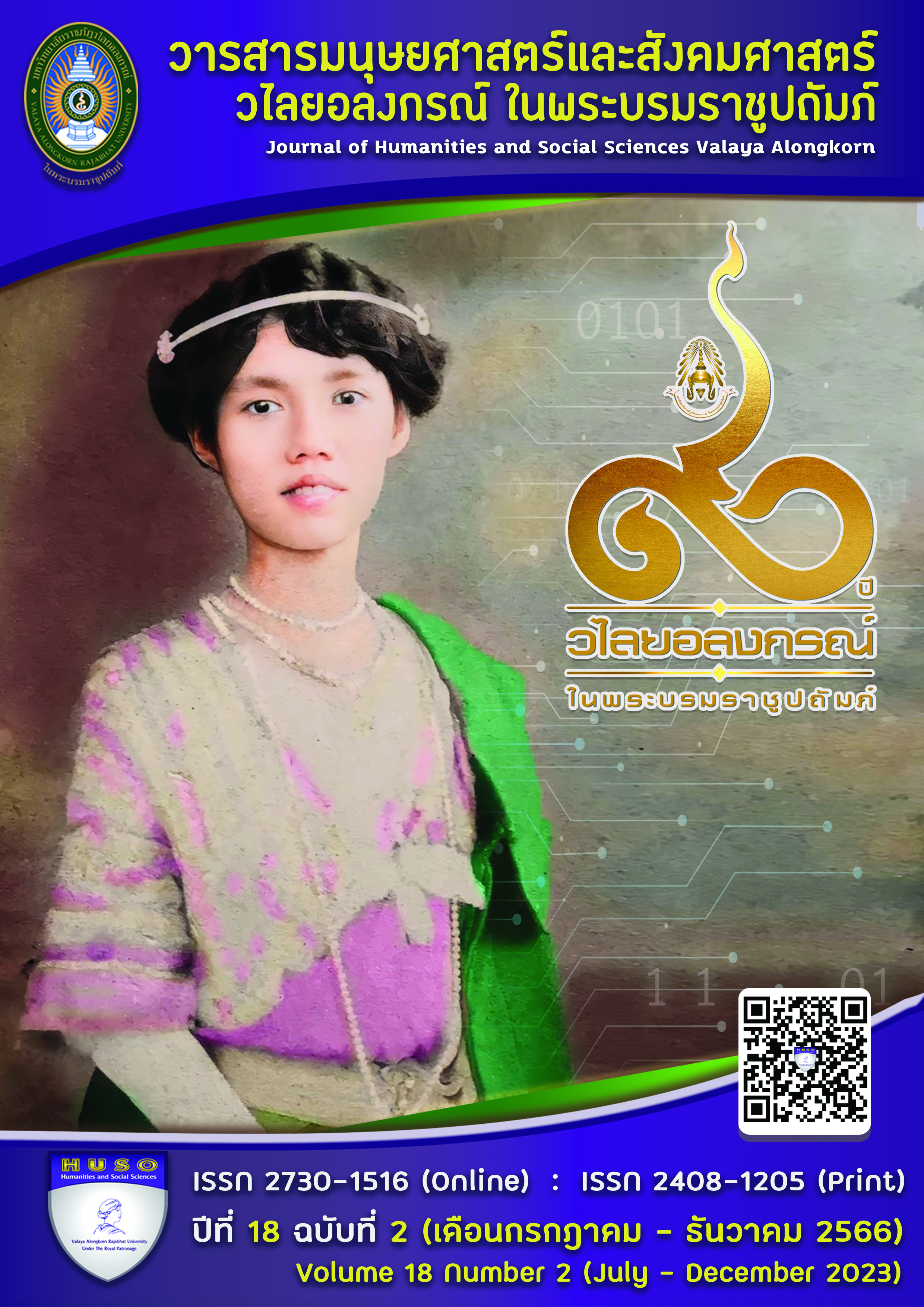DEVELOPMENT OF LEARNING MANAGEMENT MODEL BY USING PROJECT – BASED LEARNING FOR ENHANCING CREATIVE PROBLEM-SOLVING ABILITY IN HEALTH EDUCATION OF JUNIOR HIGH SCHOOL STUDENTS
Main Article Content
Abstract
The purposes of this research was to 1) develop a learning management model for health education using project-based learning for enhancing creative problem-solving abilities in health education of junior high-school students and 2) study the effectiveness of the project-based learning model. The simple random sampling technique was used to select the research sample; 30 junior high-school students from Srinakharinwirot Demonstration School, Ongkharak Campus. The research instruments applied in this study included the following: 1) a project-based learning guide model for enhancing the creative problem-solving abilities in health education with a consistency index between 0.67-1.00, 2) and assessment of creative problem-solving abilities. a consistency index between 0.67-1.00, and a confidence value of 0.85, and
3) a questionnaire regarding learning satisfaction. with is a consistency index between 0.67-1.00, and a confidence value of 0.78. The data were analyzed using basic and test statistics (independent t-test).
The research results were as follows: 1) The project-based learning model for enhancing the creative problem-solving abilities in health education of junior high-school students consisted of four learning stages (S3C) namely: Spark Ideas, Collaborative Learning, Creative Communication, and Conclusion. Additionally, the results of the effectiveness of the project-based learning model revealed that 2.1) after implementing the project-based learning, the average scores of the experimental group were higher at a significant level of .05. Moreover, 2.2) the satisfaction towards the project-based learning model for health education was at a high level.
Article Details

This work is licensed under a Creative Commons Attribution-NonCommercial-NoDerivatives 4.0 International License.
ลิขสิทธิ์บทความวิจัยที่ได้รับการตีพิมพ์เผยแพร่ในวารสารมนุษยศาสตร์และสังคมศาสตร์ วไลยอลงกรณ์ ในพระบรมราชูปถัมภ์ ถือเป็นกรรมสิทธิ์ของคณะมนุษยศาสตร์และสังคมศาสตร์ มหาวิทยาลัยราชภัฏวไลยอลงกรณ์ ในพระบรมราชูปถัมภ์ ห้ามนำข้อความทั้งหมดหรือบางส่วนไปพิมพ์ซ้ำ เว้นแต่จะได้รับอนุญาตจากมหาวิทยาลัยเป็นลายลักษณ์อักษร
ความรับผิดชอบ เนื้อหาต้นฉบับที่ปรากฏในวารสารมนุษยศาสตร์และสังคมศาสตร์ วไลยอลงกรณ์ ในพระบรมราชูปถัมภ์ เป็นความรับผิดชอบของผู้นิพนธ์บทความหรือผู้เขียนเอง ทั้งนี้ไม่รวมความผิดพลาดอันเกิดจากเทคนิคการพิมพ์
References
ชัยวัฒน์ สุทธิรัตน์. (2559). 80 นวัตกรรมการจัดการเรียนรู้ที่เน้นผู้เรียนเป็นสำคัญ (พิมพ์ครั้งที่ 7)
แดเน็กซ์ อินเตอร์คอร์ปอเรชั่น.
ฐาปนีย์ ธรรมเมธา. (2557). อีเลิร์นนิงจากทฤษฎีสู่ปฏิบัติ. บริษัท สหมิตรพริ้งติ้งแอนดพับลิสชิ่ง จำกัด.
ติณณภพ มาลาพุด. (2565). การพัฒนารูปแบบการจัดการเรียนรู้ในเนื้อหาวิชาสุขศึกษาโดยใช้โครงงานเป็นฐานเพื่อเสริมสร้างความสามารถในการคิดแก้ปัญหาอย่างสร้างสรรค์สำหรับนักเรียนระดับชั้นมัธยมศึกตอนต้น. สถาบันวิจัย พัฒนาและสาธิตการศึกษา.
ธีรวีร์ วราธรไพบูลย์. (2557). พฤติกรรมการบริโภค : อาหารนิยมบริโภคกับอาหาร เพื่อสุขภาพ. สถาบันการจัดการปัญญาภิวัฒน์.
ประสิทธิ์ ตึกขาว. (2564). การพัฒนารูปแบบการเรียนรู้โดยใช้ชุมชนเป็นฐานเพื่อเสริมสร้างความสามารถในการใช้ทุนทางวัฒนธรรมอย่างสร้างสรรค์ สำหรับนักเรียนระดับมัธยมศึกษา. [ปริญญานิพนธ์ปรัชญาดุษฎีบัณฑิต ไม่ได้ตีพิมพ์]. มหาวิทยาลัยศรีนครินทรวิโรฒ.
ยุพาพันธ์ มินวงษ์. (2558). การพัฒนารูปแบบการเรียนการสอนโครงงานวิทยาศาสตร์ที่เน้นการแก้ปัญหาอย่างสร้างสรรค์ (3P) ของนักเรียนชั้นมัธยมศึกษาปีที่ 2. [ปริญญานิพนธ์การศึกษาดุษฎีบัณฑิต ไม่ได้ตีพิมพ์]. มหาวิทยาลัยศรีนครินทรวิโรฒ.
ศิรภัสสร ศรเสนา. (2557). ความสามารถในการแก้ปัญหาอย่างสร้างสรรค์ของนักเรียนชั้นประถมศึกษาปี ที่ 3
ที่เรียนด้วยวิธีการแบบเปิด (Open Approach). [วิทยานิพนธ์มหาบัณฑิต ไม่ได้ตีพิมพ์]. มหาวิทยาลัยขอนแก่น.
สุชาติ โสมประยูร และ เอมอัชฌา วัฒนบุรานนท์. (2553). เทคนิคการสอนสุขศึกษาแบบมืออาชีพ (พิมพ์ครั้งที่ 1). บริษัทสำนักพิมพ์ดอกหญ้าวิชาการ จำกัด.
สุลัดดา พงษ์อุทธา และ วาทินี คุณเผือก. (2558). อาหารและโภชนาการในประเทศไทย:เราอยู่ตรงจุดใดในปัจจุบัน (รายงานประจำปี). แผนงานวิจัยนโยบายอาหารและโภชนาการเพื่อการสร้างเสริมสุขภาพ มูลนิธิเพื่อการพัฒนานโยบายสุขภาพระหว่างประเทศ กระทรวงสาธารณสุข.
สำนักงานคณะกรรมการศึกษาขั้นพื้นฐาน. (2542). พระราขบัญญัติการศึกษาแห่งชาติ พ.ศ. 2542. พริกหวานกราฟฟิค.
สำนักงานเลขาธิการสภาการศึกษา. (2552). การปฏิรูปการศึกษาในทศวรรษที่สอง (พ.ศ. 2552-2561). กระทรวงศึกษาธิการ.
สำนักงานสถิติแห่งชาติ. (2561). การสำรวจพฤติกรรมการบริโภคอาหารของประชากร พ.ศ. 2560. กองสถิติพยากรณ์ สำนักงานสถิติแห่งชาติ.
สำนักงานสถิติแห่งชาติ. (2564). การสำรวจพฤติกรรมด้านสุขภาพของประชากร พ.ศ. 2564. กองสถิติพยากรณ์ สำนักงานสถิติแห่งชาติ.
Chanyam, P. (2015). Development of a Learning Activity Package using Gamification Strategies and Online Collaborative Graphic Organizers Based on Project-Based Learning to Enhance Creative Problem Solving Ability in Business and Ethics of Undergraduate Students in Business Administration Program. (Unpublished Master Degree of Education Program). Chulalongkorn University.
National Statistical Office. (2017). The 2017 Food Consumption Behavior Survey. Bangkok: Statistical Forecasting Division. National Statistical Office.
National Statistical Office. (2021). Health Behaviour of Population Survey 2021. Bangkok: Statistical Forecasting Division. National Statistical Office.
Phonguttham, S. and Khun Phuak, W. (2015). Thailand food and nutrition: 2015 Where are we now? (Annual Report). Nonthaburi: Food and Nutrition Policy Research Plan for Health Promotion Foundation for the Development of International Health Policy Ministry of Public Health.
Prasit tuekkhaow. (2021). Development of Community-Based Learning Model for Promoting Secondary School Students’ Capability of Creative use of Cultural Capital. (Unpublished Doctor of Philosophy). Srinakharinwirot University.
Somprayoon, S. and Wattanaburanon, A. (2010). Professional Health Instruction. 1th edition. Bangkok: Danex Inter Corporation
Sornsena, S. (2014). Creative problem-solving abilities of Mathayomsuksa 3 students studying with an Open approach. (Unpublished Master of Education Program in Educational). Khon Kaen University.
Suthirat, C. (2016). 80 Innovative learning management that focuses on students. 7th edition. Bangkok: Dokya Academic Publishing Co., Ltd.
Thammetha, T. (2014). E-Learning: from theory to practice. Nonthaburi: Sahamit Printing and Publishing Co., Ltd.
Treffinger D. J. and S. G. Isaksen. (2007-2208). “A New Renaissance? PreparingProductive Thinkers for Tomorrow’s World.” Creative Learning Today, pp. 1.
Treffinger, Donald J.; & Isaksen, Scott G. (2005). Creative Problem Solving: the History, Development, and Implications for gifted Education and Talent Development. Gifted Child quarterly. 49(4): 342-353.
Waratornpaibul, T. (2014). Consumption Behavior : Consumerism Food and Health-Conscious Food. Panyapiwat Institute of Management.
Yupapun Minwong. (2015). Development of a Science Project Instructional Model with the
Emphasis on Creative Problem Solving (3P) of the Eighth Grade Students. (Doctor of
Education Degree). Srinakharinwirot University.


